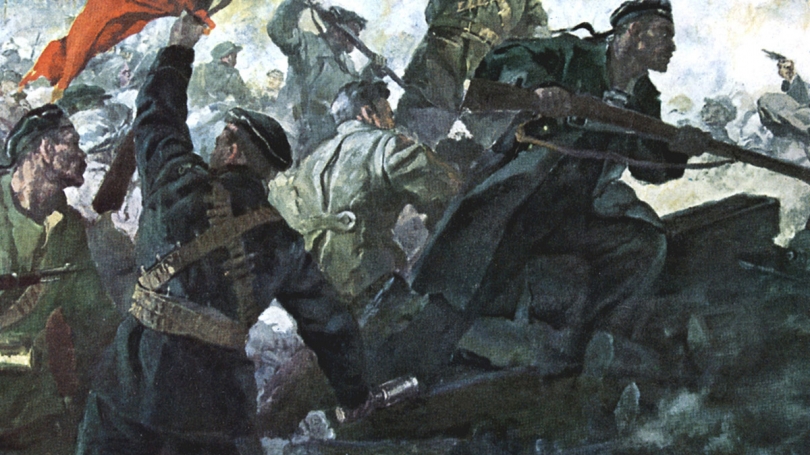
- About
- Programs
- Student Opportunities
- For Faculty
- News & Events
Back to Top Nav
Back to Top Nav
Back to Top Nav
Back to Top Nav
Back to Top Nav
Also see the Dartmouth News article on the 1917 Series.
"The past is never dead. It's not even past," William Faulkner famously wrote in his novel Requiem for a Nun. Here at the Dickey Center, we tend to focus on the present and the foremost issues of the day. Sometimes, though, it is necessary to head upstream and reconsider the historical events that brought us to where we are.
This year's fall term is one of those times, and we are devoting a good deal of energy to an unusual series of events marking the centennial of 1917, a year with a good claim to be the pivotal one in the transition from the relative peacefulness of the 19th century to the tumultuous, all-too-tragic 20th century. The year was filled with political drama and bloodshed, but two events stand out: the October Revolution in Russia and the entry of the United States into World War I.
The turbulence of the time set off reverberations in all directions as revulsion at the states that presided over the carnage of the war deepened. There was a stirring of the desires of peoples around the world to be rid of their colonial masters and chart their own independent course; an upending of aesthetic traditions in literature, music and the visual arts; the struggle of women in numerous Western countries for the vote was energized as were the demands of minorities for equal treatment. Events in Russia stoked the hopes of workers in the West and the horror of the moneyed classes. Over the longer term, the emergence of the Soviet Union and America's first step toward a role of global engagement set the stage for the nearly half century contest of the Cold War and, one might argue, the emergence of post-communist Russia as an embittered revisionist power that is today shaking the global order.
The past is never dead, but it is sometimes overlooked, forgotten or ignored. At a moment when we have entered a period of sudden and unsettling fluidity in international affairs, when familiar structures and arrangements – including the European Union, NATO and the multilateral diplomatic system – seem less assured than just a year or two ago, it makes sense to revisit the earth-shaking events of a century ago. With worrisome hints that the world may be reverting to earlier, less disciplined norms of international politics, the time is right for reconsideration of an earlier period, when a seemingly stable world came rapidly and disastrously undone. In short, it is a moment to deepen our historical consciousness.
Our 1917 centennial series of events kicked off on September 18 with an outstanding lecture by Professor Stephen Kotkin of Princeton entitled "War. Revolution. Socialism. War." that looked at the global history of the period and asked the question how one world war could lead to another and how the East-West confrontation evolved. Throughout the series other guests are examining the aesthetic revolution of the period, the experience of African-Americans in World War I and the varied wartime experiences of two famous Ernests – Hemingway, and Bicknell, head of the International Red Cross during World War I. We also revisit Dartmouth during the war, when military trainees dug trenches in the football stadium to prepare themselves for the fighting in France and Belgium. The series will conclude with a lecture by the renowned historian Timothy Snyder, an expert on the rise of fascism. The lectures were all complemented by an exhibition at Rauner Library and a series of films from the period.
I am particularly pleased so many others on campus have joined together to realize this effort. This 1917 centennial is being co-sponsored by the Leslie Center for the Humanities, the Political Economy Project and the Departments of History, Government, Russian and Film and Media Studies, all of whom have played a role in planning the schedule of events – and all of whom agree that the outsize events of 1917 had profound and enduring effects that helped shape the world of 2017. The series is supported in large part by the Dickey Center's Mary and Peter R. Dallman 1951 Great Issues Lecture funds. Check the Dickey Center calendar for information on upcoming events in the series.
Daniel Benjamin, Norman E. McCulloch Director of the John Sloan Dickey Center for International Understanding
VIDEOTAPED 1917 CENTENNIAL SERIES LECTURES
September 18: Stephen Kotkin: War, Revolution, Socialism, War
September 28: Chad Williams: Torchbearers of Democracy: African American and World War I
October 12: Dartmouth at War, 1914-1918
October 19: World War I, Red Cross Propaganda, and the Making of Ernest Hemingway
October 27: The Year that Shook the Arts: Literature and Cinema in the Russian Revolution
November 6: Origins of Unfreedom: Russia, Europe, America